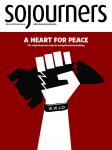DURING THE BALKAN war of the early ’90s, I traveled twice to Bosnia and Croatia. I visited middle-class women whose husbands and sons had been brutally killed. I visited a refugee center filled with people who had lost everything and were at the mercy of any country that would take them in. I visited school children suffering from post-traumatic stress after seeing their parents killed by enemy shells that landed in their homes.
I walked through the rubble of Mostar, where the Friendship Bridge—a massive stone structure named in honor of the many ethnic groups that had crossed it for four centuries—had been bombed and destroyed. In city after city, I saw the destruction of architecture, art, museums—a violent erasure of the cultures that had thrived there.
It was the first time I had seen war up close, and I was shocked by what human beings do to each other.
While I traveled in the Balkans, another war was waged in Rwanda by Hutus against Tutsis—what we now refer to as the Rwandan genocide. Since 2009 I’ve traveled twice to the Democratic Republic of Congo, where the ethnic battles forged in Rwanda crossed borders and continue to this day. As usual in war, civilians pay the highest price. Subsistence farmers in small villages want only to live in peace, tend their crops, and feed their families. Instead, their crops are burned, wives and daughters are raped, and many become slave labor in Congolese mines that provide minerals for our cell phones and wealth for the violent criminals who control the mines.
Shortly after first visiting Congo, I went to Israel and walked slowly through the halls of Yad Vashem, the Holocaust memorial in Jerusalem. I’ve walked those horrifying halls numerous times as I’ve hosted American Christians who want to learn more about the Israeli/Palestinian conflict. We can’t understand the present without exploring the past, so we visit Yad Vashem. We also meet with Israeli citizens who have lost family and friends to the violence of Palestinian extremists.
And we visit Arab families who lost their homes and lands in 1948 as a result of the founding of the state of Israel. We visit Palestinians in the West Bank who have lived under the harsh realities of Israeli military occupation since 1967. We meet with Israeli human rights activists who advocate on behalf of the desperately poor and marginalized Palestinians of Gaza.
All these meetings are heartbreaking.
I went to college to be a social worker and volunteered for years in ministries that serve the poor. Along the way, I ended up in places of violent conflict where I encountered heartbreaking realities: mothers weeping as they send their sons and daughters into harm’s way; civilian men, women, and children killed in indiscriminate crossfire; the infrastructure for essential human services going up in flames. I learned that every good work we do is undone by war. However earnest our acts of compassion and our fight for justice, our efforts will be futile if there is no peace.
Because of this, I am devoting myself to peacemaking. Wherever I go in the world, I want to be quick to listen to differing perspectives and slow to pick sides. I want to do my best to understand complexity and avoid simplistic answers. I want to raise funds for refugees and other victims of violence, and protest—to whatever extent I can—the escalating costs of war.
If I were a pragmatist, I might not bother to do this. But I am a follower of Jesus. As such, I don’t think I can do otherwise.

Got something to say about what you're reading? We value your feedback!